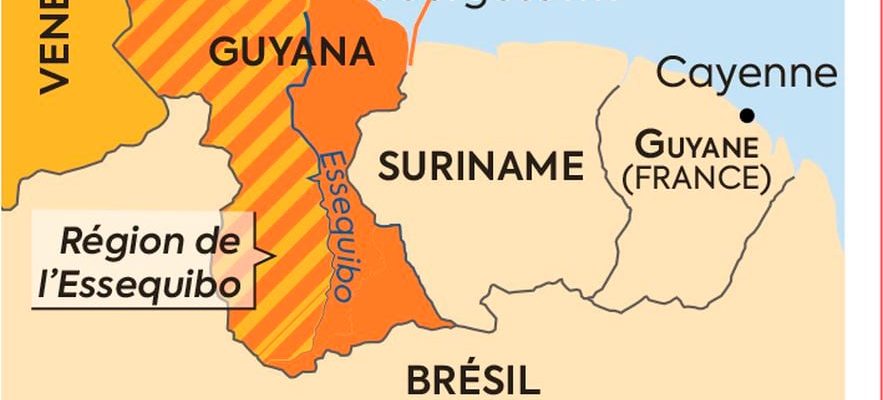And now the president of Venezuela is turning into a warlord! On New Year’s Eve, Nicolas Maduro announced the mobilization of 5,682 fighters on the Guyana border. According to him, the arrival of a British patrol boat with 50 soldiers on board off the coast of the neighboring country, for a routine exercise, amounts to a “threat” to Venezuela! A somewhat fanciful statement, according to naval expert Emmanuel Véron: “As its name indicates, a patrol boat is used to… patrol, he quips, not to organize troop landings. For this, we use amphibious ships .” In addition, 50 soldiers would be insufficient to go into battle against the Venezuelan dictatorship.
For a month, the autocrat at the head of the country has been working hard to artificially create friction on the border of the former British colony of Guyana (independent since 1966), of which Caracas has claimed two thirds of the territory since the 19th century. The Essequibo dispute – the name of the region in question – was settled by international arbitration in 1899. But on December 3, Maduro organized a disputed referendum on the subject. On the surface, the result was, as he put it, “a complete success”: 95% of the votes in favor of annexation. The only problem was that the polling stations were almost empty. But, it’s the “narrative” that counts…
The next day, the Venezuelan ordered the granting of oil licenses in order to exploit black gold in Guyana – a country which was not his, therefore. A “com” operation: the country of the Bolivarian revolution, which ruined its own oil industry (and pushed 7 million compatriots into exile) would be hard-pressed to bring out the slightest drop of black gold from the sub-region. Amazonian soil, which is full of them. “The ambitions of the Marxist Maduro are not economic,” notes political scientist Juan Claudio Lechin, an expert on Latin American populism. For this unpopular dictator, it is a question of regaining legitimacy around a nationalist project, and, above all, of cause regional tensions which come on top of other international crises of the moment. Because it is no coincidence that the problem in Guyana – where the American Exxon extracts oil – arises following the war in Ukraine, of the Hamas-Israel conflict or the destabilization of maritime traffic in the Red Sea by the Houthis of Yemen.”
Caracas threatens to annex the Essequibo region.
© / cartography legends
“Create one, two, three Vietnams”
Besides Maduro taking advantage of the fact that international attention is focused elsewhere, these sources of tension have the common point of fueling an anti-Western project, in which Moscow, Beijing, Tehran, Havana and Caracas find themselves. For some of these capitals, it is a question of “creating one, two, three Vietnams”, according to the famous expression of Che Guevara.
Moreover, the migration crisis on the border of the United States with Mexico is part of this same pattern. It is constantly fed by charter flights, like the plane grounded before Christmas in France, coming from the United Arab Emirates and bound for Nicaragua, another country of the anti-Western axis. Its 303 Indian passengers then had to travel from Managua to the United States by crossing Mexico. “Russia and China, but also Havana and Tehran, without forgetting Caracas, are embroiled in a war of friction which, like the guerrillas of the past, has the simple objective of harassing the enemy on several fronts, to exhaust it and facilitate the development of anti-imperialist rhetoric”, continues Juan Claudio Lechin.
Russia is notably in the lead. “She sees her relationship with Cuba and, since 2005, with Venezuela as a way of projecting her power into the backyard of the United States,” explains Maria C. Werlau, author of Cuba’s Intervention in Venezuela (2019, untranslated). Moscow has also reportedly taken over control of the former Soviet listening station at Lourdes, in Cuba. “For their espionage operations in the United States and Latin America, as well as in Africa, the Russians often rely on Castro agents, introduced everywhere thanks to networks cultivated over six decades. Whether they are black, mixed-race or white, they are less detectable than the Slavs,” adds “Cubanologist” Werlau who estimates the number of Cuban spies and agents of influence at around 5,000 in the United States and 1,600 in Latin America. “Perfectly trained and blended into the landscape, the Cubans are the political-military operators of the Russians, Chinese and Iranians in the region,” underlines Juan Claudio Lechin. As facilitators, they are also the ones who opened the “market” to them. “of Venezuela, including the arms business, mines and false identity documents.” In the years to come, Westerners would be wrong to underestimate this international movement which aims to weaken them, even in South America.
.
